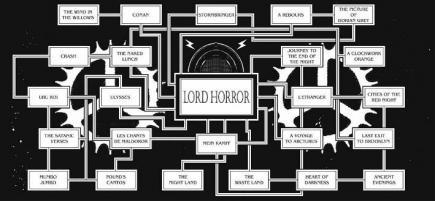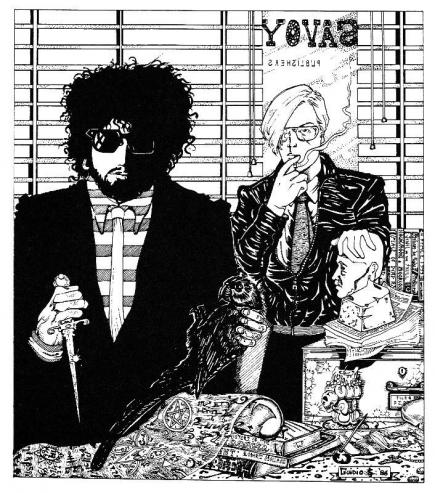The controversial and reclusive author of the last book to be banned in the UK under the Obscene Publications Act is curating an exhibition in Manchester on boundary-pushing literature.
Coming back into the public eye for his first exhibition in 40 years, Michael Butterworth is presenting the ‘Use and Abuse of Books’ exhibit running between August 14 and September 5.
The shock-author’s infamous 1989 novel Lord Horror was the last publication to be banned under the Obscene Publications Act in 1992 and will feature in the exhibition.
The showcase will look at text, images and rare promotional content from provocative and challenging literature and question whether the depiction and description of horrific acts are justified in satire.
The exhibition also offers a rare glimpse at some of the colourful Savoy publishing house’s vast archives.
Speaking ahead of the exhibition to MM, Butterworth said: “It would be nice if people left with a better insight into a radical publishing house that has received very little attention or coverage except for its court cases.”
The proud owner of the ‘most banned publishing company in Britain’ moniker, Savoy has perhaps unsurprisingly, not had the most vanilla of histories.
Raided more than 60 times by police, the publisher has produced numerous titles since its inception and the exhibition aims to provide a wider cohesive picture.
Butterworth and fellow author David Britton formed Savoy Books in the 70s and it had a profound effect on both their lives.
“I can’t speak for David, but it had a vast effect on my life,” he said.
“There were now two of us, another person we each had to ‘take on’. Each of us brought qualities the other lacked, so we produced together a ‘third person’.”
It was a subsequent impact of a spell in prison for Britton that drove him onto writing the last book to be banned under the Obscene Publications Act.
In 1992 Lord Horror was declared by Judge Gerrard Humphries as ‘a glorification of racism and violence’.
“He is claustrophobic, and realised in the horror of his Strangeways cell that life was too short,” he said.
“That spurred him to write Lord Horror more than anything else. When he came out, he began writing it, and I helped him.”

The book was controversially banned under Section Three of the Obscene Publications Act, rather than a conventional trial by jury before being overturned in the courts.
Butterworth said: “[I felt] a sense of injustice at the time, but a sense of justice when the charge was overturned.
“There was no sense of disdain, just of unfairness.”
However this was tempered by the fact that, at the same crown court hearing, the ban on Savoy’s other comics was not overturned.
“It also altered my view of the establishment in the sense that I began to see it as a police state, which at first unsettled me terribly,” he said of his experiences at Savoy.
These tribulations lead on to the question of what if the book had been published today.
A text centred on fascism and anti-Semitism, Butterworth acknowledged, would always be a sensitive issue but argued: “I think people today are much more sophisticated.

“I think people today are better able to see that Lord Horror, far from attempting to glorify racism, actually brings the horror back into focus.
“It was a subject that was and still is in danger of becoming meaningless through intense media repetition and the black-and-white terms in which it is presented.”
Butterworth believed the internet and societal changes have freed things up making it acceptable, possibly beneficial, to discuss a particular subject or use it in art.
“The problem we may have now is not censorship, but the opposite: now boundaries have largely been broken down there are none to fight against, except invented ones.
“We could be in for an era of stasis in the arts.”
When asked about the future of the Manchester literary scene Butterworth enthused: “I can’t really answer this as there is too much going on, far more than there ever used to be.
“There is less critical writing than, say, London.”
This is something Butterworth’s latest project Corridor8 is trying to help address.
In 1960’s Manchester, Butterworth came under the influence many authors at a time the world faced different challenges.
“When I first started writing for New Worlds, I was concerned with one of the other big ‘facts’ of the world I was born into, the threat of nuclear war,” he said.
“I was angry at mankind and all my early career was driven by this anger.”
For any budding alternative writers Butterworth advised potential authors to get involved in the arts scene through the Other Room or the Manchester International Festival.
“Experimental writing is not something you can advise, it’s either in you to experiment or it’s not.
“It wasn’t just a 1960s’ thing. I’m wired that way.
“If someone took offense at an exhibit I would hopefully be able to explain to them its point of the exhibit.”
Will Carr, Deputy Director at the International Anthony Burgess Foundation hosting the exhibition, added: “’We’re delighted to be working with the Centre for the Use & Abuse of Books on this exhibition.
“There’s some really unusual material that tells one of the great hidden stories of Manchester publishing, and it’s a fascinating and disturbing show.
“As Anthony Burgess said, being disturbed is part of the human condition.”
To find out more www.lifeanduseofbooks.org /@ECLUB, www.anthonyburgess.org/@misterenderby or contact [email protected]
All images courtesy of Savoy except main courtesy of International Anthony Burgess Foundation, with thanks.



